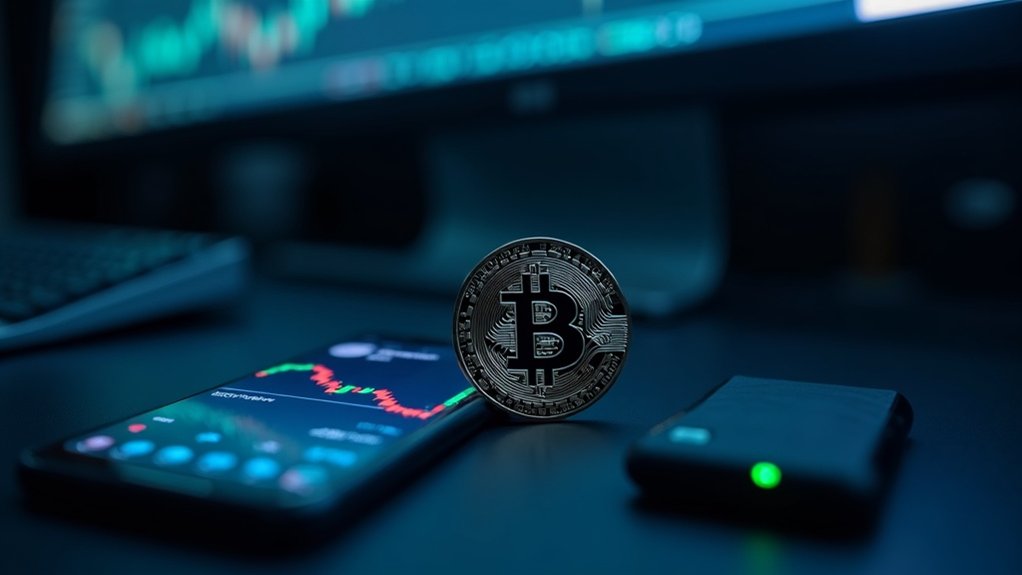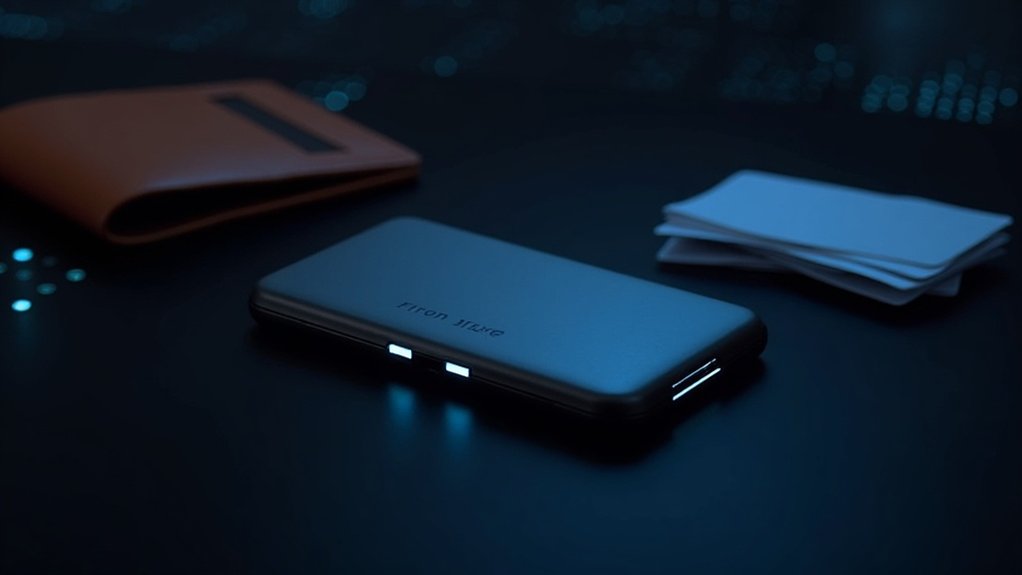Bitcoin works like digital cash without banks. Users buy it on exchanges like Coinbase, then transfer it to personal wallets for security. Spend Bitcoin at accepting merchants, swap it for other cryptocurrencies, or convert back to traditional money. Always use two-factor authentication and strong passwords. Lost keys mean lost coins—no exceptions. Transactions become permanent once confirmed. The crypto world rewards those who understand its basic security rules.
Why struggle with Bitcoin when it’s actually pretty straightforward?
People make it sound complicated.
It’s not.
Bitcoin is digital money that works without banks.
Anyone can buy it, even in small amounts—as tiny as a fraction called “satoshis.”
No need for a whole coin.
Getting started means choosing a cryptocurrency exchange.
These platforms let you trade regular money for Bitcoin.
Popular exchanges like Coinbase or Binance offer user-friendly interfaces for beginners.
Market orders buy immediately.
Limit orders wait for your preferred price.
Smart move.
Before clicking “buy,” double-check everything—especially fees.
They add up.
Once purchased, your Bitcoin appears in your exchange account.
Exchange wallets are convenient but not the safest option.
Like keeping cash in your pocket versus a safe.
For better security, transfer Bitcoin to a personal wallet.
You’ll need your wallet’s receiving address—a long string of letters and numbers.
Transfers can take minutes or longer when networks get busy.
No patience? Tough luck.
Bitcoin isn’t just for holding.
More businesses accept it for purchases now.
Pay by sending Bitcoin to the merchant’s address.
Once confirmed, these transactions can’t be reversed.
Period.
Many wallets offer QR code scanning to avoid typing errors.
Thank goodness.
Traders can swap Bitcoin for over 200 other cryptocurrencies or convert back to dollars or euros.
Trading platforms charge fees ranging from 0.1% to 4%.
Use two-factor authentication.
Always.
Seriously.
Security matters.
Cold storage (offline wallets) beats internet-connected “hot wallets” every time.
Exchanges might insure funds, but don’t count on it.
River stands out by offering proof of reserves so you can verify every Satoshi in your account.
Use strong passwords.
Update software regularly.
Watch for scams—they’re everywhere.
Some people buy Bitcoin as a long-term investment.
Others trade actively.
The value swings wildly—sometimes doubling, sometimes crashing.
Not for the faint-hearted.
Bitcoin’s fixed supply of 21 million ensures scarcity and protection against inflation that plagues traditional currencies.
Whatever approach you choose, remember: Bitcoin doesn’t forgive mistakes.
Lost keys mean lost coins.
Forever.
No customer service to call.
No reset button.
Just you and your digital money.
Frequently Asked Questions
Is Bitcoin Legal in My Country?
The answer depends entirely on location.
Not specified in the question.
Bitcoin’s legal status varies dramatically worldwide.
Fully legal in El Salvador and Malta.
Restricted in China – completely banned.
Many countries fall somewhere in between.
Legal but unregulated.
Legal but taxed differently.
Legal but banks hate it.
Without knowing the specific country, impossible to say if Bitcoin’s allowed, regulated, or forbidden.
Geography matters.
A lot.
Next time, mention the country.
Can I Recover Bitcoin if I Lose My Wallet?
Bitcoin recovery depends entirely on what’s lost.
Seed phrase? Possibly recoverable with partial information.
One missing word? Solvable.
Four missing words? Dream on.
Without private keys or seed phrases, those coins are basically space junk—floating forever in the blockchain.
Professional recovery services exist, but they’re not magicians.
Plenty of scammers too, preying on desperate wallet-losers.
Best recovery odds come when you’ve got partial backups or data fragments.
Complete loss? Those bitcoins are gone. Period.
How Does Bitcoin Mining Affect the Environment?
Bitcoin mining is an environmental nightmare.
It devours massive amounts of electricity—mostly from fossil fuels.
In the US alone, mining operations consumed 32.3 terawatt-hours in a single year.
That’s more than Los Angeles uses.
The carbon footprint? Staggering.
Over 85 million metric tons of CO2 globally in 2020-2021.
It would take planting 3.9 billion trees to offset just one year’s damage.
Plus, it pollutes the air with PM2.5 particles, affecting millions of Americans’ health.
Not exactly earth-friendly.
What Happens to Bitcoin When the Internet Goes Down?
When the internet goes down, Bitcoin basically freezes.
Transactions can’t be broadcast to the network or confirmed on the blockchain. Period.
Users can still prepare and sign transactions offline, but they’re stuck in limbo until connectivity returns.
Cold storage methods like hardware wallets keep funds secure during outages.
Some tech nerds use Bluetooth mesh networks for limited peer-to-peer transfers (about 300 meters range).
But ultimately, no internet means no confirmations. Bitcoin waits for no one—except internet providers.
Can Governments Shut Down or Regulate Bitcoin?
Governments can’t completely shut down Bitcoin. It’s decentralized—running on thousands of computers worldwide. No off switch exists.
They can regulate it though. Laws targeting exchanges, wallet providers, and banks make using Bitcoin harder but not impossible.
The U.S. is actually creating frameworks like the GENIUS Act to legitimize crypto while maintaining oversight.
Bitcoin finds a way. Ban it in one country? Users turn to VPNs or peer-to-peer trading. The cat’s already out of the bag.








